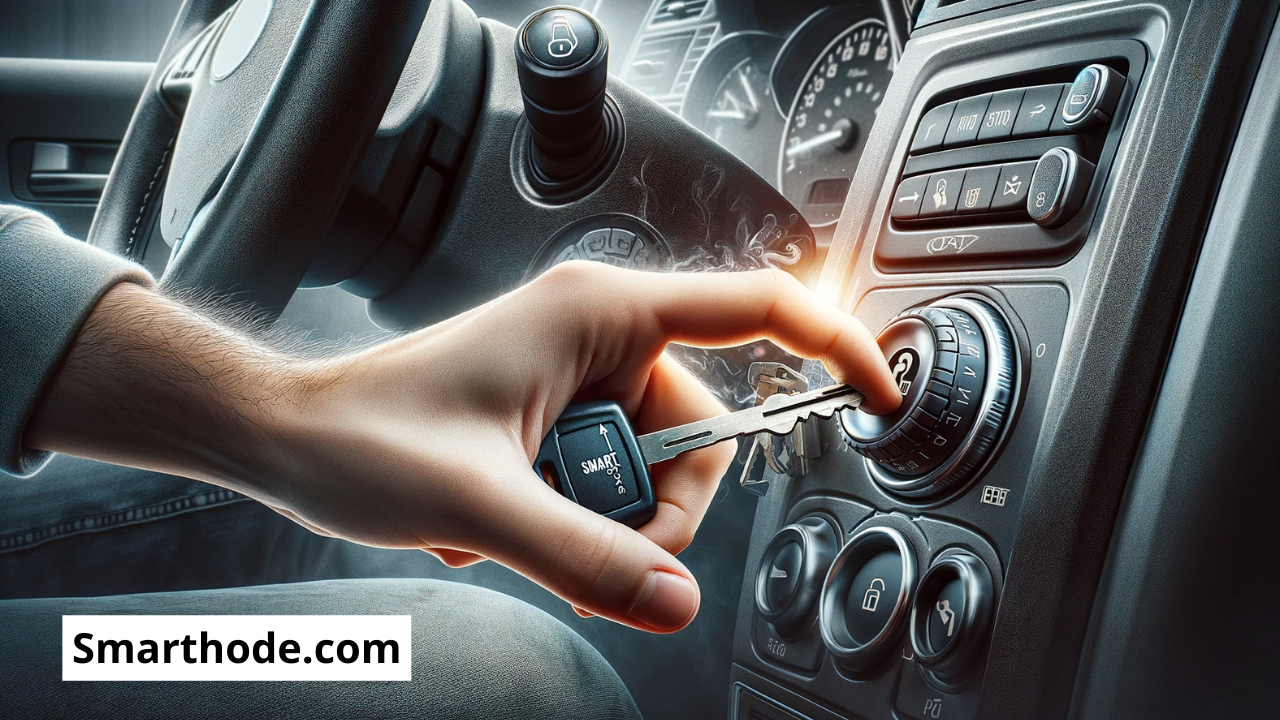Kontak Anahtarı Dönmüyor: Nedenleri ve Çözümleri
A key that won’t turn can be caused by simple issues like a locked steering wheel or a more serious issue like a faulty key switch.
If quick fixes don’t work, consult a mechanic or locksmith to prevent further damage. Regular maintenance can help prevent future key problems.
In this article, we will look at 8 common reasons why your ignition key may not turn and offer effective solutions to help you fix the problem.

Read More: What is a Thermostat? How is it Used in Cars?
Kontak Anahtarınızın Dönmemesinin 8 Yaygın Nedeni
Kontak anahtarınız dönmediğinde, bu durum kısa sürede can sıkıcı bir hal alabilir.
En sık karşılaşılan nedenler için bazı pratik açıklamalar şöyle:
1. Steering Lock
One of the most common reasons why your ignition key won’t turn is the steering lock. This lock is engaged when you turn off your car and can prevent the key from turning if it’s not in the correct position. The fix for this problem is simple. Simply use a little force to turn the key while trying to turn the steering wheel. This should release the lock and allow the key to turn.
2. Worn Key
Over time, your ignition key can wear out. This can cause the key to no longer engage with the ignition cylinder properly, preventing it from turning. If you think your key is worn out, you can try using a spare key or having a new key made by a professional locksmith. This should fix the problem and get the key turning smoothly.
3. Defective Ignition Cylinder
Another possible cause for your ignition key not turning is a faulty ignition cylinder. The ignition cylinder is the component that houses the key and initiates the ignition process. If the cylinder is damaged or worn, it may not allow the key to turn. In this case, you may need to have the faulty ignition cylinder replaced by a qualified mechanic.
4. Dead Battery
In some cases, a dead battery can also cause the ignition key not to turn. When the battery is completely dead, there may not be enough power to activate the ignition system. The solution to this problem is simple: simply jump start your vehicle or replace the dead battery with a new one. Once the battery has enough power, the key should turn without any problems.
5. Faulty Ignition Switch
If you have tried all of the above solutions and your ignition key is still not turning, there may be a problem with the ignition key. The ignition key is an electrical component of the ignition system. If it fails, it can prevent the key from turning. In this case, you may need to have the faulty ignition key replaced by a professional mechanic.
6. Debris in Ignition Cylinder
Sometimes, debris can get into the ignition cylinder and prevent the key from turning. This debris can be dust, dirt, or even small objects like pieces of a broken key. To fix this problem, you can try using compressed air to blow any debris out of the ignition cylinder. If that doesn’t work, you may need to have the cylinder cleaned or replaced by a professional.
7. Ignition Lock Cylinder Worn Out
Similar to a worn key, the ignition lock cylinder can also wear out over time. This can cause the pins inside the cylinder to no longer align correctly, which can prevent the key from turning. In this case, you may need to have the ignition lock cylinder replaced by a professional locksmith or mechanic.
8. Damaged Key Tumbler
The key tumbler is the component inside the ignition cylinder that the key interacts with. If the key tumbler is damaged, it may not align properly with the key and prevent it from turning. In this case, you may need to have the key tumbler replaced by a qualified mechanic.
Preventive Maintenance for Your Vehicle’s Ignition System
Regular maintenance of your vehicle’s ignition system is key to preventing ignition switch problems. Here are some tips:
1. Regular Key Inspection
Check your keys frequently for signs of wear or damage. Bent keys or worn teeth can be early indicators of potential problems.
Steering Wheel Care
Avoid using the steering wheel to support yourself when entering or exiting the vehicle, as this can place unnecessary load on the steering lock mechanism.
3. Battery Maintenance
Check the health of your car battery regularly. Keeping it fully charged and clean can prevent electrical problems that can affect the ignition system.
4. Clean the Ignition Cylinder Regularly
Over time, dust and debris can accumulate in the ignition cylinder. Using compressed air to keep the cylinder clean can prevent blockages.
5. Avoid Heavy Keychains
A heavy keychain can put extra weight on the ignition cylinder, which can cause wear and tear. Use a lightweight keychain to reduce the load.
6. Professional Service
Have your vehicle’s ignition system checked regularly by a professional, especially if you notice any signs of wear or difficulty turning the key.
7. Lubrication
Occasionally, lubricating the ignition cylinder can help keep the key turning smoothly. However, this should be done sparingly and preferably by a professional to avoid attracting more dirt.
Read More: What is MPI Engine
Bottom Line
Dealing with an ignition key that won’t turn can be frustrating, but understanding the reasons behind it can help you find the right solution. Whether it’s a steering lock, a worn key, a faulty ignition cylinder, a dead battery, a faulty ignition key, gunk in the ignition cylinder, a worn ignition lock cylinder, or a damaged key tumbler, there are solutions available. Timely professional help can resolve more complex issues and keep your vehicle reliable and ready to go.
Regular maintenance, such as battery checks, key checks, and avoiding excessive force on the ignition cylinder, can prevent many of these problems. Keeping a spare key and being aware of signs of ignition system wear can help you stay stranded. Remember, your vehicle’s ignition system is vital to its operation, and taking good care of it is key to a smooth driving experience.
FAQ About Ignition Key Problems
1: Can weather affect my ignition switch?
Yes, extreme temperatures can cause your key to contract or expand slightly, which can lead to difficulty turning the ignition. Additionally, cold weather can cause the locking mechanism to freeze.
2: Is it safe to spray lubricant into the ignition cylinder?
Lubrication can help, but it is important to use the right type of lubricant. Graphite-based lubricants are generally recommended for firing cylinders. Avoid oil-based products because they can attract dirt.
3: How often should I replace my car keys?
There’s no set rule for how often you should replace your car keys. It depends on their condition and wear. If you notice your key is bent, worn, or has trouble turning in the ignition, it’s time to replace it.
4: Can a locksmith fix ignition switch problems?
Yes, locksmiths are skilled at handling a variety of key and lock related issues, including those related to car ignitions. They can replace worn keys, repair or replace ignition cylinders, and provide emergency assistance if you’re locked out.
5: What should I do if my key turns but the car doesn’t start?
If the key turns but the car won’t start, the problem may not be the ignition switch, but the car’s starter, battery, or other electrical components. It’s best to consult a mechanic for a thorough diagnosis.
